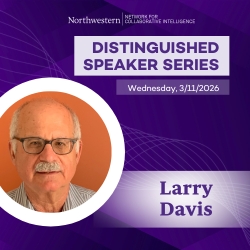Events
Past Event
Benjamin Lindquist - "The Irrational Computer: Chance, Creativity, and the History of Random Neural Nets"
Science in Human Culture Program - Klopsteg Lecture Series
4:30 PM
//
Hagstrum 201, University Hall
Details
Speaker
Benjamin Lindquist - History, Northwestern University
Title
"The Irrational Computer"
Abstract
In the middle of the twentieth century, some engineers came to the paradoxical conclusion that before computers could become more “human,” they first had to become less “rational.” In particular, the birth of machine learning hinged on the notion that an unpredictable element was necessary for computers to beat a Turing test or simulate creativity. My study reveals how a perceived link between creativity and chance led to the creation of the first “random” neural networks in the 1950s. This association between randomness and creativity hailed from the art world, where original thought had long been linked to chance operations, divergent thinking, and even mental illness. At the time, rationalist critics attacked random neural nets as careless and chaotic. Historians of computing have followed suit by overemphasizing the tradition of Boolean algebra and deductive logic. In contrast, my work uncovers a faint but perceptible trace of disorder that was central to the rise of machine learning. Rather than viewing the notorious hallucinations of large language models as a recent phenomenon and a deviation from computing’s historical norms, I map the contested meanings of chance to highlight the ongoing political stakes involved in the use and governance of stochastic systems.
Biography
Before earning a Ph.D. from Princeton University, Benjamin Lindquist trained as a painter at the School of the Art Institute of Chicago (BFA) and Yale University School of Art (MFA). This background has shaped his current interest in the history of computing. Specifically, his work asks how tools and concepts drawn from the world of art influenced early computer simulations of human creativity, intelligence, and emotion.
Time
Monday, January 13, 2025 at 4:30 PM - 6:00 PM
Location
Hagstrum 201, University Hall Map
Contact
Calendar
Science in Human Culture Program - Klopsteg Lecture Series
"Fun with Fashion" - Larry Davis
Northwestern Network for Collaborative Intelligence (NNCI)
12:00 PM
Details

Join us for an in-person Distinguished Speaker event featuring Larry Davis, a leading figure in computer vision and artificial intelligence whose influential academic career and recent industry innovations at Amazon have helped shape modern approaches to visual understanding and generative media.
Title: "Fun with Fashion"
Abstract: More than 100,000,000 customers shop for clothing online at Amazon annually in the United States alone. The fashion catalogue is enormous and changes with high velocity as new styles are introduced and older items either go out of fashion or out of stock. Customers are challenged to find clothing that fits their style and their bodies at a price that fits their budgets. The Amazon Fashion science team addresses these challenges through the design and development of new machine learning and computer vision models that help customers navigate the catalog and efficiently evaluate items Amazon is recommending to them. The talk will discuss solutions the team has developed to problems including virtual try on (what will this garment look like on me?), complementary recommendations (how do I style this garment?) and size recommendations (what size, if any, of this garment will fit me?), emphasizing the challenges introduced by the need to have scalable solutions.
Lunch will be provided. Registration is required.
Larry Davis is a Senior Principal Scientist in Amazon’s Fashion and Fitness organization. He joined Amazon in 2018 after a long career in academics. At Amazon he worked on introducing novel customer experiences for fashion shopping like outfit builder (based on complementary recommendations) and virtual try on. He led Amazon’s first GenAI team for image and video synthesis, developing models to diversify the catalogue to make it more relatable for our customers. . He received his Ph. D. from the University of Maryland in 1975 and from 1977-1981 was an Assistant Professor of Computer Science at the University of Texas in Austin. He returned to the University of Maryland in 1981 and was the founding Director of the University’s Institute for Advanced Computer Studies (1985-1994). He also served as Chair of the Department of Computer Science from 2000-2012. Larry retired from the University in 2021 and is now a Professor Emeritus and a College Park Professor. He advised more than 75 Ph. D. students at Texas and Maryland. His work spanned many aspects of computer vision, including applications in visual navigation, robotic vision, media forensics, remote sensing,fashion and fundamental problems of object detection and activity recognition. He is a Fellow of both the IEEE and the ACM.
Time
Tuesday, May 12, 2026 at 12:00 PM - 1:30 PM
Location
Calendar
Northwestern Network for Collaborative Intelligence (NNCI)
